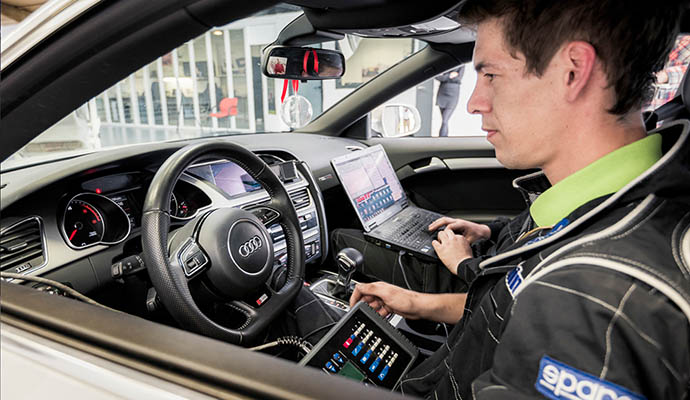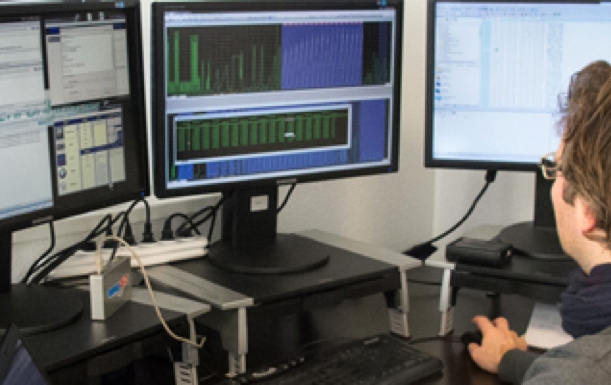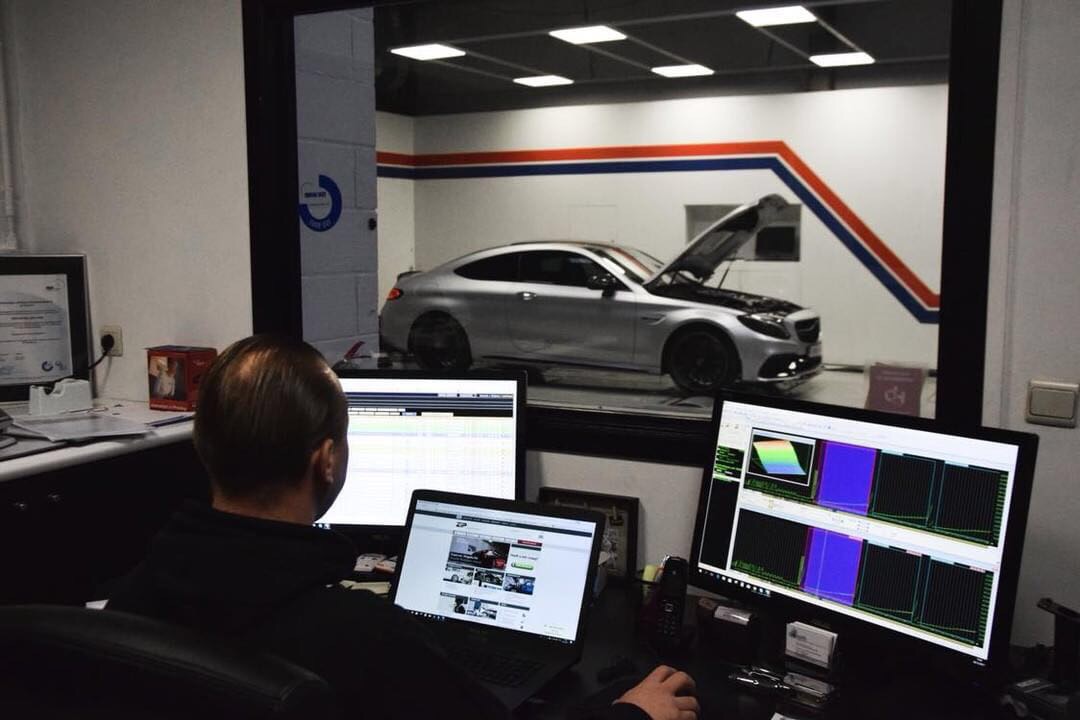Tuning Files
High-Quality ECU Tuning Files
As automotive engineers and petrol heads, we understand the intricate balance between performance, efficiency, and reliability in modern vehicles. Engine Control Unit (ECU) tuning has emerged as a powerful tool to optimize this balance, unlocking hidden potential within stock engines. This article delves into the scientific process behind developing high-quality ECU tuning files and explains our comprehensive service offering at ZipTuning.
The basics of ECU Tuning
ECU tuning involves modifying the software parameters that control various engine functions. By recalibrating these parameters, we can enhance performance, improve fuel efficiency, and even alter the driving characteristics of a vehicle.

The primary areas of focus in ECU tuning include:
- Fuel injection timing and quantity
- Ignition timing
- Boost pressure (for turbocharged engines)
- Valve timing (for engines with variable valve timing)
- Torque limiters and rev limiters
Dyno developed tuning files
At ZipTuning, our approach to creating high-quality tuning files is rooted in rigorous testing and data analysis. The process involves several key steps:
Dyno Testing and Datalogging
We begin by establishing a baseline of the stock engine's performance using a dynamometer. This allows us to measure power output, torque curves, and fuel consumption accurately.

During dyno runs, we extensively datalog various engine parameters, including:
- Air-fuel ratios (AFR)
- Ignition timing
- Boost pressure
- Exhaust gas temperatures (EGT)
- Intake air temperatures (IAT)
- Knock sensor activity
Map Modifications
Based on the collected data, we modify various maps within the ECU:
- Fuel maps: Adjusting fuel injection quantity and timing to optimize AFR for performance and efficiency.
- Ignition maps: Fine-tuning ignition timing to maximize power output while maintaining safe combustion.
- Boost maps: Increasing boost pressure in turbocharged engines while ensuring safe operation.
- Torque limiters: Adjusting or removing torque limitations to unleash full engine potential.
Road Testing and Long-Term Reliability Assessments
After initial dyno tuning, we conduct extensive road testing to ensure the tune performs well in real-world conditions. This includes:
- Cold start behavior
- Transient throttle response
- Part-load efficiency
- Full-load performance
- High-speed stability

Long-term reliability is crucial, so we subject our tunes to extended testing periods, often spanning several years, to validate their durability and consistency.
Tuning Stages and Hardware Modifications
ZipTuning offers three primary stages of tuning, each tailored to different levels of hardware modifications:
| Stage | Hardware Modifications | Performance Gains |
|---|---|---|
| Stage 1 | Stock hardware | 10-25% increase |
| Stage 2 | Upgraded exhaust (no catalyst/filter) | 15-35% increase |
| Stage 3 | Turbo upgrade | 25%+ increase |
Additional Services
Beyond standard performance tuning, ZipTuning offers specialized services:
- Gearbox/TCU tuning for optimized shift points and faster gear changes
- Emission system modifications (DPF, AdBlue, EGR, lambda sensor, and catalyst deletes) for off-road or racing applications
- Pop and bang tuning for enhanced auditory experience
Our Unique Approach
What sets ZipTuning apart is our commitment to quality and customer satisfaction:
- Extensive database of developed files, allowing for rapid customization
- Quick turnaround times (average 15 minutes to maximum 1 hour)
- Competitive pricing without compromising on quality
- High-quality support and customization options to meet specific client needs
Customer Process
Our streamlined process ensures a smooth experience for our clients:
- Registration and credit purchase on our website
- ECU read and file upload by the customer
- File modification and quality check by our engineers
- File delivery through our online portal
- Customer installation and testing
- Ongoing support and fine-tuning as needed
We pride ourselves on our responsive support, ensuring customer satisfaction throughout the tuning process.
Package Deals
To cater to diverse needs, ZipTuning offers various package deals, including:
- Stage 1/2 + Gearbox TCU tune
- Stage 1/2 + Gearbox TCU tune + Pop and bang
- Full emission delete packages for diesel and petrol engines
- Stage 1/2 + Emission delete
Enjoy our expertise and support with our file service
FAQ´s
What experience and qualifications do your tuning engineers have?
Our engineers have over 15 years of experience in ECU tuning and hold degrees in automotive engineering. They regularly attend industry workshops and seminars to stay updated on the latest technologies.
How do you ensure the reliability and safety of your tuning files?
We conduct extensive dyno testing and real-world driving tests for each tune. Our files undergo long-term reliability assessments, often spanning several years, to ensure durability and consistency.
What is your average turnaround time for delivering a tuning file?
Our average turnaround time is 15 minutes, with a maximum of 1 hour for Stage 1 and 2 tunes. More complex tunes may take longer, but we always strive for quick delivery.
Do you offer support if I encounter issues after installing the tune?
Absolutely. We provide ongoing support and fine-tuning as needed. Our team is always ready to assist with any issues or questions you may have.
Can you provide custom tunes for modified engines?
Yes, we specialize in custom tunes for modified engines. Our extensive database and experienced engineers allow us to create optimized tunes for various modifications.
What kind of performance gains can I expect from your Stage 1, 2, and 3 tunes?
Typically, Stage 1 offers 10-25% gains, Stage 2 provides 15-35% increases, and Stage 3 can deliver 25%+ improvements. However, exact gains depend on the specific vehicle and modifications.
How do your prices compare to other tuning file providers?
We offer competitive pricing without compromising on quality. Our prices are generally in the mid-range of the market, reflecting our commitment to both affordability and excellence.
Do you offer bulk discounts for purchasing multiple tunes?
Yes, we offer tiered pricing for bulk purchases. The more tunes you buy, the lower the per-unit cost becomes. Please contact us for further information.
What file formats are your tunes compatible with?
Our tunes are compatible with all major ECU file formats. We can provide files in .bin, .hex, .ori, and other formats as needed.
Can you provide tunes for both gasoline and diesel engines?
Yes, we offer tuning solutions for both gasoline and diesel engines across a wide range of makes and models.
Do you offer tuning for automatic transmissions (TCU tuning)?
Yes, we provide TCU tuning for automatic transmissions, optimizing shift points and improving overall transmission performance.
How often do you update your tuning files to accommodate new vehicle models?
We continuously update our database to include new vehicle models. Generally, we can provide tunes for new models within 3-6 months of their market release.
What is your policy on refunds or adjustments if a customer is unsatisfied?
We offer free adjustments if the initial tune doesn't meet expectations. In cases where we can't resolve the issue, we provide a full refund of the credits.
Do you offer support if I encounter issues while installing the tune (with the tuning tools)?
Absolutely. We provide ongoing support if you encounter issue while writing the ecu. Non of the tuning tools is 100% proof, so we understand this and we can often provide a quick fix to solve the issue with the tuning tool.
Can you create tunes that maintain emissions compliance for road-legal vehicles?
Yes, we offer tunes that enhance performance while maintaining emissions compliance for road-legal use.
What security measures do you have in place to protect your tuning files from unauthorized copying?
We DO NOT use any encryption and unique identifiers (noread) to our tuning file to prevent unauthorized copying or use.
Do you offer training or resources to help my staff understand and work with your tunes?
No, we provide only modified tuning files from the original the customer uploaded on our website. Reading and writing the software of the ecu is the responsibility of the customer.
Can you provide references from other workshops that use your tuning files?
Absolutely. We have a list of satisfied clients who are willing to share their experiences. We can provide these references upon request.
What is the process for becoming a reseller or partner for your tuning files?
Interested workshops can apply through our website. We evaluate each application based on experience, market potential, and alignment with our quality standards.
Do you offer any guarantees on the performance or reliability of your tunes?
We offer a 30-day satisfaction guarantee on all our tunes. If you're not happy with the performance, we'll work with you to adjust the tune or provide a refund of credits.
What tuning tools are your tunes compatible with?
Our tunes are compatible with all major tuning tools, as long as you can provide us with an open solution (master files).
What services do ZIPtuning offer?
Ask for more information through ticket, if your request is possible with your software version.
AdBlue Dosing Limitation / DEF Limitation
Reducing the amount of AdBlue (Diesel Exhaust Fluid) injected into the exhaust system to limit its use.
AdBlue Deactivation / SCR Removal / DEF Deactivation
Completely disabling the AdBlue system or removing the Selective Catalytic Reduction (SCR) components from the vehicle.
AGS Removal / Active Grill Shutter Removal
Removing the Active Grill Shutter system to prevent it from regulating airflow through the radiator.
Anti-Lag System Activation / ALS Activation
Enabling an anti-lag system to maintain turbo boost pressure during off-throttle periods, reducing turbo lag.
Automatic Transmission Tuning / AT Tuning
Customizing the shifting patterns and behavior of automatic transmissions for better performance and drivability.
BMS/BPCM Recovery / Battery Management System Recovery
Restoring the Battery Management System or Battery Power Control Module functionality to ensure optimal battery performance.
Boost Sensor Calibration / Turbo Sensor Calibration
Adjusting the calibration of the boost (turbo) sensor for more accurate pressure readings.
Burble Activation / Pops & Bangs Activation
Enabling the engine to produce popping and banging noises during deceleration, often for aesthetic purposes.
Catalyst Deactivation / Catalyst Removal
Disabling or removing the catalytic converter and fault codes from the ECU software.
Cold Start Improvement / Cold Start Optimization
Enhancing the engine’s performance and start-up process during cold conditions.
Cold Start Noise Deactivation / Cold Start Noise Reduction
Reducing or eliminating the noise produced by the engine during cold start-up.
CPC Controller Tuning / Common Powertrain Controller Tuning
Adjusting the settings of the Common Powertrain Controller to improve overall vehicle performance and powertrain management.
Cylinder on Demand Deactivation / Cylinder Deactivation Disable
Disabling the system that allows certain engine cylinders to shut down under light load conditions to save fuel.
DCU / ACM Tuning / Diesel Control Unit Tuning / Aftertreatment Control Module Tuning
Modifying the settings of the Diesel Control Unit or Aftertreatment Control Module for better control over diesel engine parameters and aftertreatment systems.
Diesel Particulate Filter (DPF) Deactivation / DPF Removal
Disabling or removing the DPF to prevent soot accumulation and regeneration cycles, often for off-road use.
DTC Removal / Diagnostic Trouble Code Removal
Clearing or preventing specific diagnostic trouble codes from being recorded by the engine control unit.
ECU Tuning / Engine Control Unit Tuning / ECM Tuning
Customizing the software of the Engine Control Unit to enhance engine performance, efficiency, and response.
Evaporative Emission Control System (EVAP) Deactivation / EVAP Removal
Disabling or removing the EVAP system, which controls fuel vapor emissions from the fuel system.
Exhaust Flap Control / Valve Control
Customizing the operation of the exhaust flap valves for desired exhaust sound and performance characteristics.
Exhaust Flaps Deactivation / Exhaust Flap Removal
Disabling or removing the exhaust flaps that control exhaust flow for noise or performance purposes.
Exhaust Gas Recirculation (EGR) Deactivation / EGR Removal
Disabling or removing the EGR system, which recirculates a portion of the exhaust gases back into the engine cylinders.
Flex Fuel Tuning / E85 Tuning
Adjusting the engine management system to run on ethanol-blended fuels, such as E85, for improved performance and flexibility.
Fuel Injector Calibration / Fuel Injection Tuning
Adjusting the fuel injectors’ parameters for optimal fuel delivery and combustion efficiency.
GPF/OPF Deactivation / GPF/OPF Removal
Disabling or removing the Gasoline Particulate Filter (GPF) or Otto Particulate Filter (OPF) to reduce backpressure.
Hot Start Fix / Hot Start Optimization
Addressing issues with engine starting when the engine is hot to ensure smoother and more reliable starts.
IMMO Removal / Immobilizer Removal / Anti-Theft System Deactivation
Disabling or removing the vehicle’s immobilizer system to bypass the anti-theft feature.
Kickdown Deactivation / Kickdown Disable
Disabling the kickdown function, which downshifts the transmission when the accelerator is fully pressed for maximum acceleration.
Lambda Sensor Deactivation / O2 Sensor Deactivation / Lambda/O2 Removal
Disabling or removing the lambda (oxygen) sensors that monitor and adjust the air-fuel mixture.
Launch Control / Launch Assist Activation
Enabling a system that helps the vehicle accelerate from a standstill with maximum traction and minimum wheel spin.
Mass Air Flow Sensor (MAF) Deactivation / MAF Removal
Disabling or removing the MAF sensor, which measures the amount of air entering the engine for air-fuel mixture control.
Methanol Injection Calibration / Water-Methanol Injection Calibration
Calibrating the lambda values for an engine with a water-methanol injection system to increase power and reduce engine temperatures.
NLS Activation / No-Lift Shift Activation
Enabling no-lift shifting, allowing the driver to shift gears without lifting the throttle for faster acceleration.
Oil Pressure Correction / Oil Pressure Adjustment
Adjusting the oil pressure parameters to ensure optimal engine lubrication and performance.
Popcorn Activation / Popcorn Limiter Activation
Enabling a feature that creates a “popcorn” sound effect at the exhaust during deceleration.
Readiness Calibration / Emissions Readiness Adjustment
Adjusting the vehicle’s readiness monitors to reflect appropriate emissions system status.
RPM Limiter Raise / Rev Limit Increase
Increasing the maximum RPM limit for higher engine performance.
Selective Catalytic Reduction (SCR) Deactivation / AdBlue Deactivation / SCR Removal
Disabling or removing the SCR system that reduces NOx emissions using AdBlue.
Shift Timing Optimization / Gear Shift Calibration
Adjusting the timing of gear shifts for improved acceleration and drivability.
Soft Rev Limiter Removal / RPM Limiter Removal
Removing or increasing the RPM limit that restricts engine speed to protect components.
Speed Limiter Deactivation / Speed Limiter Removal / vmaxoff
Disabling or removing the speed limiter that restricts the vehicle’s top speed.
Sport Displays Calibration / Performance Gauge Calibration
Adjusting the sport displays or performance gauges to provide accurate and customized performance data.
Start/Stop Disable / Start/Stop System Deactivation
Disabling the start/stop system that automatically shuts down the engine when the vehicle is stationary.
Start/Stop System Inversion / Start/Stop Logic Reversal
Reversing the logic of the start/stop system to change its default behavior.
Supercharger Tuning / Supercharger Optimization
Adjusting the parameters of a supercharged engine to maximize performance after installing a performance pulley.
TCU Tuning / DSG Tuning / Gearbox Tuning
Modifying the Transmission Control Unit (TCU) or Direct Shift Gearbox (DSG) settings for improved shifting performance.
Throttle Response Enhancement / Throttle Lag Reduction
Modifying the throttle control settings to improve engine response and reduce throttle lag.
Throttle Valve Actuators (TVA) Deactivation / TVA Removal
Disabling or removing the throttle valve actuators that control air intake for the engine.
Torque Monitoring Deactivation / Torque Management Disable
Disabling the system that monitors and manages engine torque to prevent driveline damage.
Variable Swirl Actuator (VSA) Deactivation / Swirl Flap Removal
Disabling or removing the variable swirl actuator that optimizes air-fuel mixture in the engine for improved combustion efficiency.

